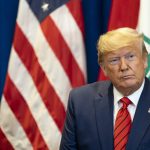President-elect Donald Trump’s latest move to boost the American manufacturing sector is both bold and brilliantly straightforward. He has announced the creation of a new government agency, the External Revenue Service, aimed squarely at implementing tariffs on foreign nations. This initiative centers on the belief that making imported goods more expensive will give American manufacturing the shot in the arm it desperately needs. It’s about time someone had the guts to put America first in the global economic race.
In what could easily be deemed his most riveting social media post yet, Trump expressed his frustration with the current state of trade agreements that enrich everyone but the American worker. By unveiling the External Revenue Service, he aims to flip the script on foreign trade. Instead of relying solely on taxing hardworking Americans through the usual Internal Revenue Service, why not hit those who profit off American consumers? It’s a refreshing take, proclaiming that foreign traders will finally pay their fair share while allowing domestic industries to thrive.
The cornerstone of Trump’s approach rests on imposing tariffs ranging from 10 to 20 percent on imports from other nations. Such measures are intended not just to bring in revenue, but also to strengthen negotiating power—particularly in dealings with economic titan China. Old trade agreements have left American businesses at a disadvantage, and Trump doesn’t plan to lose any more ground. If Canada and Mexico want to play ball, they’re going to have to step up and tackle issues like drug trafficking and illegal immigration, or prepare to pay through the nose for their transgressions.
Donald Trump Announces Creation of a New Government Agency
https://t.co/84ecl95Fiy— Townhall.com (@townhallcom) January 14, 2025
It’s a little rich to hear critics lamenting the prospect of tariff-induced price increases on everyday goods. While they wring their hands over how tariffs might impact consumers, the truth is much simpler: It’s actually about reining in foreign exploitation. Tariffs will considerably decrease the dependency on goods produced overseas, putting American workers back in the factories and hopefully reducing the trade deficit that has plundered the domestic economy for years. It’s a classic case of short-term pain for long-term gain—though the critics who see an impending apocalypse in tariffs might need to update their doomsday forecasts.
Critics can talk all they want about inflation and rising prices, but Trump’s tariffs are about revitalizing jobs and manufacturing. They represent an important step toward rebuilding America’s economic backbone. With Goldman Sachs weights behind them, tariffs might indeed be the catalyst for achieving a prosperous, self-reliant economy. While some tout the idea that tariffs are a tax on Americans, it’s hard to forget that without tariffs, those same Americans are bearing the brunt of foreign competitors leeching off their hard work.




